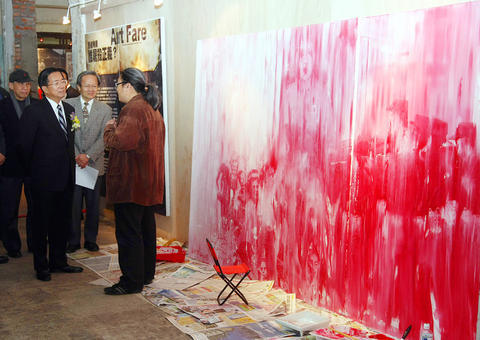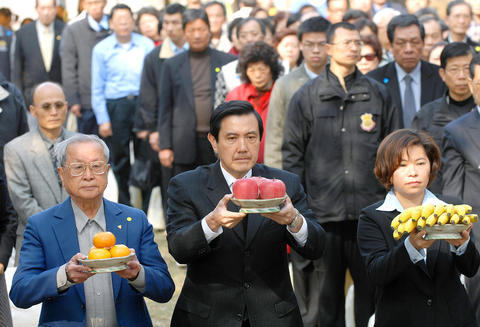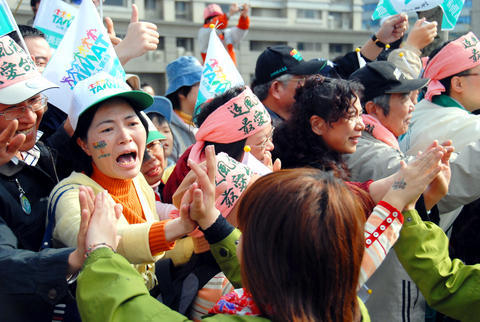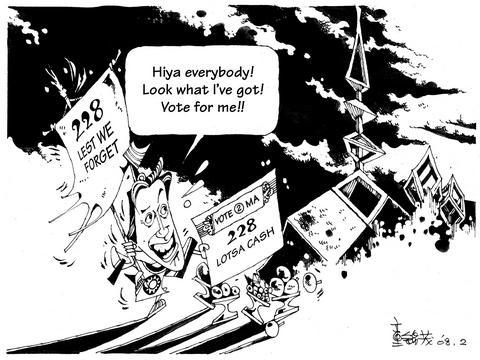|
|
| NOT
FORGOTTEN Families of victims of the 228 Incident place lilies in front of a monument in Taipei's 228 Memorial Peace Park after a memorial ceremony to mark the 61th anniversary of the killings yesterday. |
Ma promises 228 apology, new historical perspective
By Mo
Yan-chih
STAFF REPORTER
Friday, Feb 29, 2008, Page 2
Chinese Nationalist Party (KMT) presidential candidate Ma Ying-jeou (馬英九)
yesterday promised to apologize to families of 228 Incident victims and frame
the massacre as a lesson for future generations if elected president.
To work toward reconciliation with 228 survivors and family members of those who
were killed, Ma yesterday presented flowers to them at the 228 Incident monument
in 228 Memorial Park, Chiayi County.
He pledged to compile autobiographies of the victims, establish a national 228
memorial park and continue research into the crackdown if elected.
BLOCKED BUDGET
In response to pan-green camp criticism over the KMT's obstruction of the budget
for the Statute for the Handling of and Compensation for the 228 Incident
(二二八事件處理及補償條例) in the legislature, Ma blamed the Cabinet for listing the budget
under the Ministry of Education instead of the Ministry of the Interior.
Declining to respond to follow-up questions, Ma said the pan-green camp should
not politicize the issue.
Ma acknowledged the KMT's "political" responsibility for the 228 Incident, but
added that the violent crackdown should be remembered today with tolerance and
compassion.
NEW ERA
Ma said that more people look on the events of that day in 1947 with tolerance
and forgiveness. The commemoration of the incident should enter a new era and
the public should work together to ensure that future generations have a
profound understanding of the 228 Incident, tempered by love and tolerance.
"Families of the victims can choose whether to forgive the government or not. As
we [the KMT] face mistakes made in the past, however, we have no choice but to
recognize our mistakes and apologize," he said.
The memory of "the incident is very painful for many people and recognizing
historical mistakes and offering apologies aren't enough," Ma said. "Only by
helping future generations remember this historical event can we prevent similar
mistakes from happening."
The KMT and Ma's campaign team also held a 228 remembrance concert last night at
Chungshan Hall in Taipei City and arranged blood donation collection efforts
around the country.
Ma's spokesman Tsai Shih-ping (蔡詩萍) said the camp chose the arrangements in
order to remember the victims of the 228 Incident in a non-political way.
Taiwan must face the shadow of 228: Chen
By Ko
Shu-ling, Wu Cheng-Ting And Chang Jui-Chen
STAFF REPORTERS
Friday, Feb 29, 2008, Page 2
A memorial service was held at the 228 Memorial Peace Park in Taipei yesterday
to mark the 61st anniversary of the 228 Incident.
 |
| President Chen Shui-bian, left, attends the opening ceremony of an art exhibit at the 228 National Memorial Hall in Taipei. |
Speaking in Hoklo (commonly known as Taiwanese), President Chen Shui-bian (陳水扁)
said that pretending the murder of tens of thousands of people never happened,
or playing down the incident, is tantamount to rejecting universal human rights.
"If we cannot face the past, we cannot construct the future," he said.
Chen said some people had questioned whether it was necessary to continue to
commemorate the 228 Incident each year, as it happened decades ago.
Some, he said, had argued that it was meaningless to do so and that discussing
what happened only opened old wounds and exploited the past for political gains
to spark social tensions.
Citing the words of Master Sheng Yen (聖嚴法師), Chen said the country would forever
live under a shadow -- the memory of the 228 Incident and the White Terror -- if
the public did not accept and deal with the truth.
 |
| Chinese Nationalist Party (KMT) presidential candidate Ma Ying-jeou, center, presents fruit to the memory of those killed in the 228 Incident at a ceremony in Chiayi. |
The 228 Incident and authoritarian rule are not things that happened centuries
ago, they were experienced by people living now, he said.
The fight for a freer, more democratic, more just and humane country is not yet
over, he said.
A lot more must be done to ensure citizens' rights to freedom and happiness and
to ensure they live free from fear of the government, he said.
Meanwhile, despite central government regulations mandating that the national
flag be flown at half mast throughout the country on 228 Memorial Day, the
Kinmen County Government and Taya Township (大雅) Office chose to ignore the
decree yesterday.
Kinmen County Commissioner Lee Chu-feng (李炷烽) used the Kuningtou Battle in
October 1949 and the 823 Artillery Bombardment in August 1958 as an excuse to
issue an order that the county -- rather than the national -- flag be raised,
while Taya Township Mayor Wu Hsien-sen (吳顯森) personally directed township
staffers as they raised the national flag to full mast.
Wu said he could not acccept the attitude of the government, which had failed to
value major holidays such as Retrocession Day and National Day, while choosing
to focus on painful, historical incidents.
`Walk Against the Wind' comes to an end
JOYOUS JOURNEY: Participants were touched by the kindness of well-wishers who
gave them encouragement, fed them and sometimes joined in
By
Loa Iok-sin
STAFF REPORTER
Friday, Feb 29, 2008, Page 3
"Many of us started out as strangers, but became best friends along the way. We got together every night to share what we saw and felt during the day and give support to each other."-Henry Yen, `Walk Against the Wind' participant
 |
| Members of a
group taking part in the ``Walk Against the Wind'' march to show their
support for Democratic Progressive Party presidential candidate Frank
Hsieh yesterday set out from his campaign headquarters in Banciao City,
Taipei County, yesterday. The 400-strong group left at 2:28pm to
commemorate the 228 Incident.
|
Tears, excitement, warmth, friendship, tiredness and even sickness were
experienced by participants in the "Walk Against the Wind" march that started in
Oluanpi (鵝鸞鼻), the southernmost tip of the country, and finished yesterday in
Taipei.
The march was initiated by 12 young people, including former National Youth
Commission chairwoman Cheng Li-chun (鄭麗君) on Feb. 5 to support Democratic
Progressive Party presidential candidate Frank Hsieh (謝長廷).
Along the way, supporters gave participants high fives and hugs. Many joined
them on the way, expanding the team to more than 200 people yesterday.
"[On the walk] I found Taiwan to be a very, very lovely place," Sam Lang (郎恩祺),
a 23-year-old graduate student in Canada, said. "You can always find something
touching everywhere in the country."
Lang said that he was especially touched to see elementary or senior high school
students leaving their classrooms to cheer them on.
"When I was in high school [in Taiwan], the teachers never allowed us to show an
interest in politics," he said. "But it's different now -- I see hope for the
country in these young students."
Although many people lost weight during the walk, Lang gained 2kg.
"People fed us really well along the way," he said, with a big smile on his
face. "During the walk today, when people lined up along the roadsides were
giving us high fives, someone put a meatball into my mouth all of a sudden,"
Lang said. "I was surprised, but I felt touched."
"Many of us started out as strangers, but became best friends along the way. We
got together every night to share what we saw and felt during the day and give
support to each other."
Henry Yen, `Walk Against the Wind' participant
A college student who wished to known only by her last name Hung (洪) and one of
the original dozen, said that the spirit of some accompanying walkers made her
cry.
"I remember once when we were in Changhua County, a very, very old lady who
could barely walk insisted on joining us. As we were walking fast, she tried
very hard to catch up." she recounted as she walked on Zhongshan N Road in
Taipei towards Zhongshan Soccer Stadium, the end of the journey.
Although the walk was harder for the old lady, "she tried to show her care for
us by putting a candy into my mouth," Hung said.
Henry Yen (嚴江龍), also among the original dozen, was shocked when he realized how
little he knew about Taiwan.
"We visited many places where key events in Taiwan's history happened -- but I
never heard of those places before," Yen told the Taipei Times during an
interview at the stadium.
Yen injured his knees four days into the trip, but continued to walk regardless
of the pain.
"I couldn't give up. How could I?" Yen said. "I had to carry on after all the
support and good wishes we got from supporters along the way, I just couldn't
give up."
Friendship among walkers was also an important support.
"Many of us started out as strangers, but became best friends along the way,"
Yen said. "We got together every night to share what we saw and felt during the
day and give support to each other."
Besides joy, sorrow was something that Lang felt at the end of the journey.
"I feel a bit sad because I know that it will be a long time before I can run
into high fives and hugs from strangers again on the streets," he said.
There was also appreciation.
"A lot of supporters along the way thanked us but actually we owe much more to
them. We really want to thank them for their support and the warmth they showed
us," Yen said.
